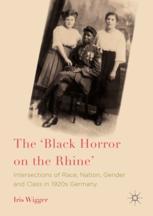

Most ebook files are in PDF format, so you can easily read them using various software such as Foxit Reader or directly on the Google Chrome browser.
Some ebook files are released by publishers in other formats such as .awz, .mobi, .epub, .fb2, etc. You may need to install specific software to read these formats on mobile/PC, such as Calibre.
Please read the tutorial at this link: https://ebookbell.com/faq
We offer FREE conversion to the popular formats you request; however, this may take some time. Therefore, right after payment, please email us, and we will try to provide the service as quickly as possible.
For some exceptional file formats or broken links (if any), please refrain from opening any disputes. Instead, email us first, and we will try to assist within a maximum of 6 hours.
EbookBell Team

4.1
90 reviewsThis book explores the 'Black Horror' campaign as an important chapter in the popularisation of racialised discourse in European history. Originating in early 1920s Germany, this international racist campaign was promoted through modern media, targeting French occupation troops from colonial Africa on German soil and using stereotypical images of 'racially primitive', sexually depraved black soldiers threatening and raping 'white women' in 1920s Germany to generate widespread public concern about their presence. The campaign became an international phenomenon in Post-WWI Europe, and had followers throughout Europe, the US and Australia. Wigger examines the campaign's combination of race, gender, nation and class as categories of social inclusion and exclusion, which led to the formation of a racist conglomerate of interlinked discriminations. Her book offers readers a rare insight into a widely forgotten chapter of popular racism in Europe, and sets out the benefits of a historically reflexive study of racialised discourse and its intersectionality.